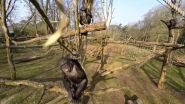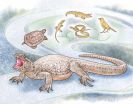Targeting newly discovered pathway sensitizes tumors to radiation and chemotherapy
2015-09-03
(Press-News.org) In some patients, aggressive cancers can become resistant to chemotherapy and radiation treatments. In a paper published in the journal Nature Communications, University of California, San Diego School of Medicine researchers identified a pathway that causes the resistance and a new therapeutic drug that targets this pathway.
"It was previously known that RAF (a family of proteins that regulate cellular signaling) governs resistance to therapies. We discovered an undescribed role for RAF and learned precisely how it occurs in a broad range of cancers," said lead author Sunil Advani, MD, assistant professor in the Department of Radiation Medicine and Applied Sciences.
The pathway is used by tumor cells to protect DNA from damage. By inhibiting the pathway using a drug-like compound called KG5, researchers were able to reverse the resistance of tumors to both radiotherapy and certain classes of chemotherapies that induce genotoxic stress. The hope is to increase survival rates among patients with highly aggressive cancers, said Advani.
"We are taking the tumor's defenses away by targeting this pathway. By developing this drug, we have the potential to enhance radiation sensitivity of cancer while sparing healthy tissue. This drug increases the DNA-damaging effects of radiation and certain chemotherapies," said principal investigator, David Cheresh, PhD, Distinguished Professor of Pathology and associate director for Innovation and Industry Alliances at Moores Cancer Center at UC San Diego Health. "We essentially get more anti-tumor activity with less radiation or chemotherapeutic drug. This allows us to see the anti-tumor effect while reducing terrible side effects. We have seen this in pancreatic, brain and lung cancer cells both in cell culture and in tumors growing in mice."
Radiation is the therapy of choice for certain cancers. In follow-up studies, researchers hope to enhance the design of KG5 to further improve its radio-sensitizing activity and safety profile so that it can be tested in patients.
"For patients with aggressive cancers, there may be no good options left," said Advani. "Armed with this new approach, our goal is utilize such a drug to improve the clinical outcomes of some of the most widely used anti-cancer therapies."
INFORMATION:
Co-authors of this study also include Maria Fernanda Camargo, Laetitia Seguin, Ainhoa Mielgo, Sudarshan Anand, Angel M. Hicks, Joseph Aguilera, Aleksandra Franovic, and Sara M. Weis of UC San Diego.
Funding for this research came, in part, from the National Institutes of Health (CA168692), California Breast Cancer Research Foundation IDEA award (19IB-0130), and ACS IRG 70-002.
ELSE PRESS RELEASES FROM THIS DATE:
2015-09-03
PHILADELPHIA -- Acupuncture may be a viable treatment for women experiencing hot flashes as a result of estrogen-targeting therapies to treat breast cancer, according to a new study from researchers at the Perelman School of Medicine at the University of Pennsylvania. Hot flashes are particularly severe and frequent in breast cancer survivors, but current FDA-approved remedies for these unpleasant episodes, such as hormone replacement therapies are off-limits to breast cancer survivors because they include estrogen. The results of the study are published this week in the ...
2015-09-03
Montreal, September 3, 2015 -- Sleep matters for kids, especially when they are stressed. A new study led by researchers Jinshia Ly, Jennifer J. McGrath and Jean-Philippe Gouin from Concordia University's Centre for Clinical Research in Health and the PERFORM Centre shows that poor sleep might explain how stress impacts health in kids.
A good night's sleep
Getting a good night's sleep might buffer the impact of stress on kids' cortisol level, which is a hormone produced in the adrenal gland to regulate the body's cardiovascular, metabolic and immune systems. While short-term ...
2015-09-03
Cool. Calm. And oh, so calculated. That's how a chimpanzee living in the Royal Burgers' Zoo in the Netherlands set out to swat an aerial drone that was filming her group. In an article in the journal Primates published by Springer, Jan van Hooff and Bas Lukkenaar explain it as yet another example of chimpanzees' make-do attitude to using whatever is on hand as tools.
The incident happened earlier this year, on 10 April, when a Dutch television crew was filming at the zoo in Arnhem. The idea was to use a drone to film the chimpanzees in their compound from different close-up ...
2015-09-03
Amsterdam, September 3, 2015 - 3D imaging of a mummified kestrel that died due to forced overeating provides evidence that the ancient Egyptians bred birds of prey as offerings for the gods, according to a new study published in the Journal of Archaeological Science. The digital CT imaging revealed that the kestrel was force-fed its last meal - a mouse - suggesting it was kept in captivity.
This is the first evidence to point to mass breeding of raptors as offerings to gods. The researchers behind the study, from the American University in Cairo, Stellenbosch University ...
2015-09-03
Amsterdam, September 3, 2015 - Elsevier, a world-leading provider of scientific, technical and medical information products and services, has announced that its Reviewer Recognition platform has launched a new functionality which enables reviewers to list their entire review history, including their reviews for non-Elsevier journals, in one place online. It also allows them to share their Reviewer Page publically - increasing visibility and recognition of their work.
Through the Reviewer Recognition platform, Elsevier reviewers already have access to a personal review ...
2015-09-03
A 260-million-year-old fossil species found in South Africa's Karoo Basin continues to provide information into the murky origins of turtles whose evolution fascinates scientists.
The fossil of an extinct reptile, named Eunotosaurus africanus, is the earliest known branch of the turtle tree of life.
"Eunotosaurus is a critical link connecting modern turtles to their evolutionary past," says Dr Gaberiel Bever an Honorary Research Associate at Wits University's Evolutionary Studies Institute (ESI) and scientist at the New York Institute of Technology.
Previous studies ...
2015-09-03
UK fisheries survey logbooks from the 1930s to 1950s have been digitised for the first time, revealing how cod responded to changing temperatures in the last century.
Scientists at the Centre for Environment, Fisheries and Aquaculture Science (Cefas) and the University of Exeter found that at the time, the warm seas experienced around Norway benefitted the cod, similar to the conditions there today.
Most cod eaten by the UK comes from northern seas including the Barents Sea around Norway, because the stocks there at the moment are at record highs. Cod stocks were also ...
2015-09-03
Study examines trees in Leicester City
Pollution levels for pedestrians reduced by seven per cent in city environment
Highlights importance of trees in urban planning decisions
Trees in cities throughout the UK could be significantly improving the quality of the air we breathe by decreasing pollution levels for pedestrians, researchers from the University of Leicester have revealed.
The team from the University of Leicester's Department of Physics and Astronomy found that trees have a regionally beneficial impact by increasing turbulence and reducing ambient ...
2015-09-03
In the first study of its kind, new research from the University of New Hampshire shows that crop rotations, in isolation from other management factors, can increase the functions performed by soil microbial communities that benefit plant growth. The study was conducted by researchers with the New Hampshire Agricultural Experiment Station.
The study was conducted by Lisa Tiemann, former postdoctoral student, Stuart Grandy, who was Tiemann's postdoctoral advisor, and Marshall McDaniel, former postdoctoral student of Grandy, all of the UNH Department of Natural Resources ...
2015-09-03
Philadelphia, PA, September 3, 2015 - People diagnosed with schizophrenia critically rely upon treatment with antipsychotic medications to manage their symptoms and help them function at home and in the workplace.
But despite their benefits, antipsychotic medications might also have some negative effects on brain structure or function when taken for long periods of time.
In fact, "the role played by antipsychotic treatment on the pathophysiologic trajectory of brain abnormalities in schizophrenia is currently a matter of lively debate," explains Dr. Antonio Vita, Professor ...
LAST 30 PRESS RELEASES:
[Press-News.org] Targeting newly discovered pathway sensitizes tumors to radiation and chemotherapy



